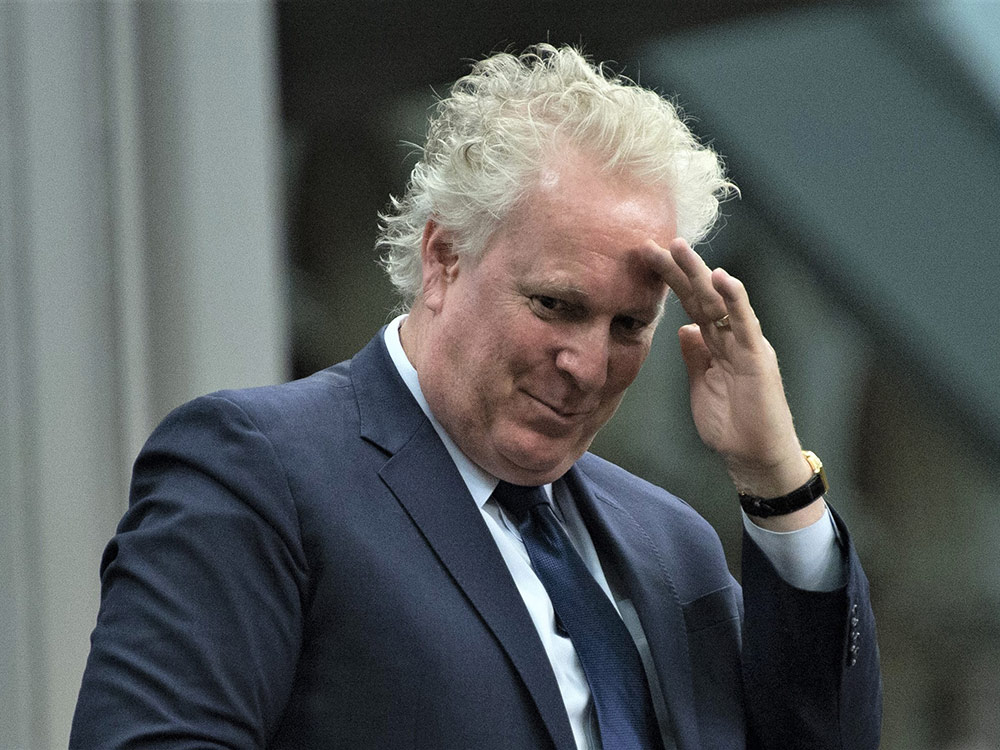Back in the day, campaign trains were a political staple — politicians would ride the rails to every whistle-stop town. As an old-school politician, might Conservative leadership candidate Jean Charest revive the practice? If so, his would probably have to be a baggage train.
Charest brings a lot to the leadership bid. Really, it's a lot.
A former party leader back when Conservatives were still called Progressive, a cabinet minister when a cellphone was big enough to knock out a Rottweiler, a man who hopes the electorate has forgotten who Karlheinz Schreiber was, and a former Quebec premier. As a Liberal. His long political career has seen more plot swings than Days of Our Lives. Charest is a living remnant of the near-extinct party left, yet now seeks to reclaim his old job in an era when prominent party members are sporting MAGA hats and crowding Maxime Bernier's fringey People's Party. A long shot? The Charest campaign slogan might as well be, “It's so crazy it just might work.”
Charest was born in Sherbrooke, Quebec. He was elected to Parliament at the age of eight, or so it might seem. When he was appointed to the cabinet of former prime minister Brian Mulroney in 1986 — as minister of state for youth, naturally — he became the youngest cabinet minister in Canadian history. Other Mulroney government posts followed: fitness and amateur sport, and minister of the environment. When Mulroney, by then deeply unpopular, finally announced his decision to step down in February 1993, the convention was scheduled for just shy of Charest's 35th birthday.
His leadership run was no youthful indulgence. Charest had the backing of 37 PC MPs and was encouraged to run by the prime minister himself. But Vancouver Centre MP and then-minister of defence Kim Campbell could claim the support of 42. It would prove to be a close race. Years later, when the first season of American Idol saw Kelly Clarkson face off against the frizzy-haired Justin Guarini it seemed like déjà vu for Canadian political observers who had already watched a race for glory in which the youthful, curly-headed candidate had fallen just short. In June 1993 Campbell won the Progressive Conservative leadership, becoming the nation's first female prime minister. Charest fared better than Guarini — he was made deputy prime minister and minister for industry, science and technology.
Charest may have divined that his near-miss was a blessing of sorts. Under Campbell the Conservatives suffered an unprecedented annihilation in the fall general election, reduced from 156 MPs to just two. Charest was one of the survivors, along with Saint John MP Elsie Wayne. Perfect for a cozy corner table at Les Fougeres.
Charest became party leader. There was neither a campaign nor even a coin toss — Charest got the gig by virtue of seniority and having a pulse. But Charest distinguished himself as PC boss, bringing the discredited Progressive Conservatives a modest 20-seat haul in 1997, nearly matching Preston Manning's upstart Reform party in votes, and putting the party back on the path to respectability that would eventually lead to a PC–Reform union in 2003.
More notably perhaps, Charest was a key leader of the “No” campaign in the 1995 Quebec sovereignty referendum. His fiery campaign performance made him a political hero in his native province, particularly among anglophones. A year after fighting the 1997 federal election he allowed himself to be lured to provincial politics as Quebec's Liberal leader. His mission, once again, was to slay the separatist dragon, this time in the National Assembly. It would not happen right away. The 1998 Quebec election saw the Parti Québécois cling to power in the face of a Liberal resurgence. But in 2003 Charest finished the job and brought the Quebec Liberals back to government.
Against the odds he would spend over nine years as premier. Charest endured periods of massive unpopularity, a spell as a minority government, and the departure of several angry cabinet ministers (including future federal NDP leader Thomas Mulcair in 2006). Along the way the Charest government established a solid record of environmentalism — when the federal government opted out of the Kyoto Accord, Charest announced that Quebec would comply on its own.
2012 saw widespread student protests over tuition fees, leading to the passage of Bill 78, which suspended classes at universities where students were striking and restricted the right to protest on or near university campuses. Bill 78 then brought other groups to the streets to protest the infringement of civil rights.
The chickens finally came to roost in September 2012 when Charest’s government was narrowly defeated by Pauline Marois and the Parti Québécois. Charest suffered personal defeat in his Sherbrooke riding, quit as leader and retired from politics.
Charest's political career has been dogged by allegations of sleaze. During a 2007 House of Commons Ethics Committee investigation it emerged that one of the financial backers of Charest's 1993 leadership bid had been Karlheinz Schreiber, the key figure in Mulroney's Airbus scandal.
As premier of Quebec, Charest created an anti-corruption unit, known as UPAC, only to see his attack dog latch onto his own leg. A lengthy UPAC investigation of his administration even led Charest to launch a lawsuit for defamation and may have played a role in his decision not to run for Conservative leader in 2020. No one was ever charged.
And then during the extradition hearings involving Meng Wanzhou, Charest and his law firm acted as consultants for Huawei. Because apparently, being a former Liberal premier investigated for alleged corruption wasn’t quite toxic enough.
Nonetheless, Charest is back and ready for battle. And he certainly offers variety.
With his moderate image and record of environmentalism, Charest provides a stark contrast to the rest of the field so far. He probably has a lock on the unenviable title of “Favourite Conservative Candidate of People Not Planning to Vote Conservative.” Charest might be advised to wait for an opening atop the NDP — as a former Conservative leader and Liberal premier, he could be the first to complete a political trifecta.
Charest's key selling point will be electability. He'll be counting on the party being tired of opposition status and ready to get practical. But the tide appears to be running against him. Conservative Sen. Leo Housakos recently said: “We have to repudiate Conservatives like Jean Charest who have an inferiority complex and want to always act like Liberals in pursuit of trying to win power.”
Charest is nothing if not resilient, however. It's notable that nearly three decades ago he first ran for the Conservative leadership the year Groundhog Day was released. Now history is repeating itself — Jean Charest is once again a fresh new face for the Conservative party leadership. Like Bill Murray, he'll be praying for a different ending this time. ![]()
Read more: Federal Politics
















Tyee Commenting Guidelines
Comments that violate guidelines risk being deleted, and violations may result in a temporary or permanent user ban. Maintain the spirit of good conversation to stay in the discussion.
*Please note The Tyee is not a forum for spreading misinformation about COVID-19, denying its existence or minimizing its risk to public health.
Do:
Do not: